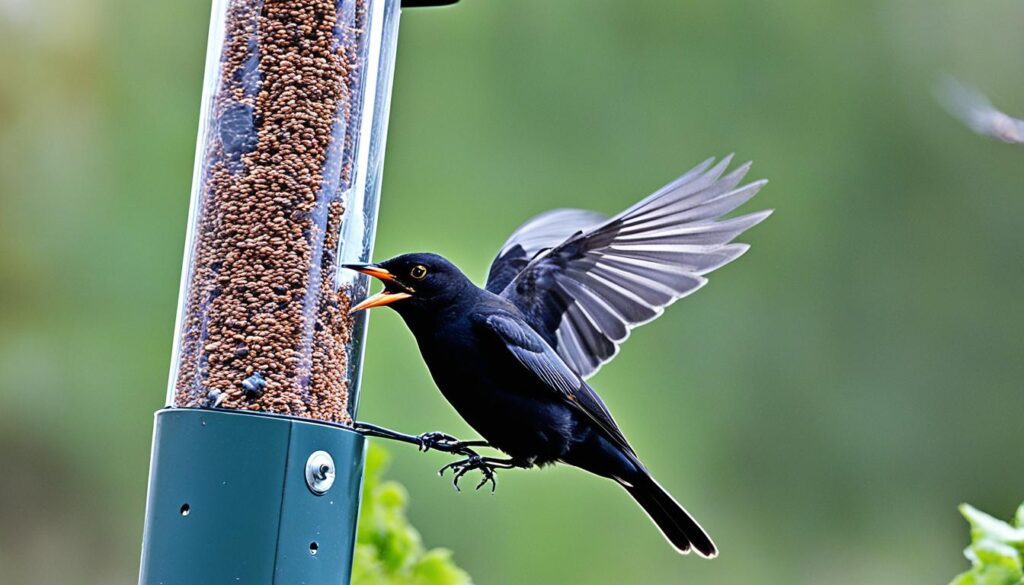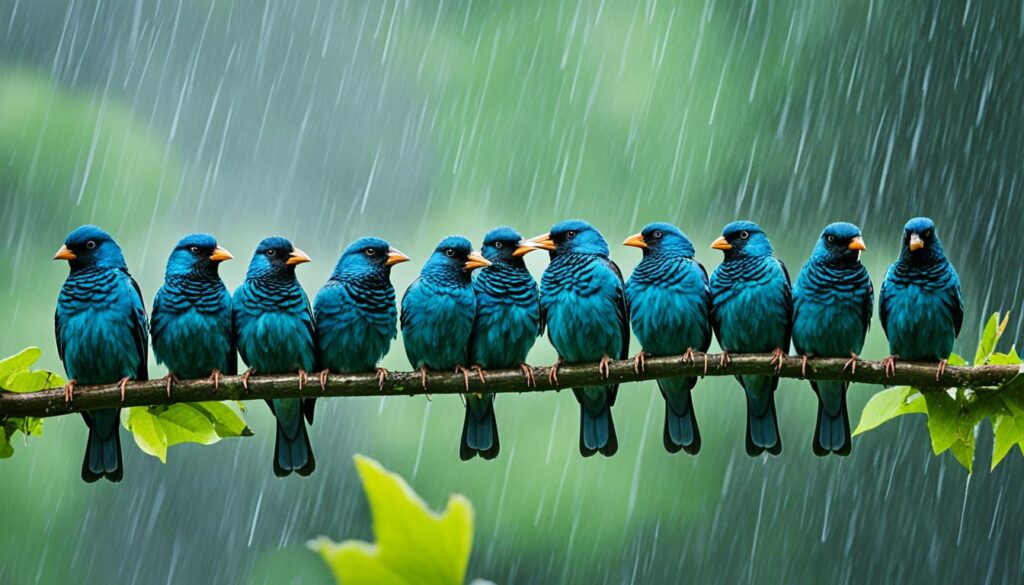According to the Migratory Bird Treaty Act, you cannot harm blackbirds directly. This means prevention is crucial. Fortunately, you can keep blackbirds away from your area effectively. I’ll tell you about various methods that are proven to work without causing harm.
Key strategies include removing their food sources. You should also stop them from perching easily. And we’ll look at the latest bird deterrents that are humane but effective. By following these methods, you can enjoy a blackbird-free space.
Key Takeaways
- Blackbirds are protected by federal law, so focus on prevention rather than direct intervention.
- Remove food sources, eliminate perching opportunities, and use humane deterrents to discourage blackbirds.
- The WhirlyBird Repeller is a leading bird deterrent that simulates a natural predator to keep blackbirds away.
- Modify bird feeders and eliminate wild berries and fruits to make your yard less attractive to blackbirds.
- Employ a range of non-lethal control methods, from spikes and netting to alarm calls and visual deterrents.
Understanding the Problem with Blackbirds
Blackbirds, like common grackles and red-winged blackbirds, can bother homeowners. They cause issues by damaging crops and polluting livestock feed. They also scare off other birds at feeding areas. Knowing why these birds are a problem is key to dealing with them.
Why Blackbirds Can Be Problematic
Blackbirds are good at living in cities and towns and often gather in large groups. This can lead to major damage, like stripping fruits from trees. They also leave a lot of droppings that can make outside areas dirty. Plus, they’re mean to smaller birds, making it hard for people to put out bird feeders.
Legal Considerations for Bird Control
Blackbirds are under protection by the Migratory Bird Treaty Act. So, homeowners can’t just get rid of their nests, as it’s against the law. Removing blackbirds must be legal and kind. It’s important to know the rules in your area before trying to scare them off.
| Why Blackbirds Are Problematic | Legal Considerations for Bird Control |
|---|---|
|
|
Learning about blackbird problems and the laws can help homeowners. They can find good and legal ways to handle these birds without breaking the law.
Prevention is Key to Blackbird Control
Dealing with a blackbird infestation requires a focus on prevention. Since it’s often illegal to remove them, it’s best to make your area uninviting. This stops the birds from causing trouble in the first place.
Species like red-winged blackbirds and common grackles are found in the U.S. South and cause a lot of problems. They damage crops, spoil feed, and make areas messy. Keeping them away helps keep things clean and safe.
Understanding Blackbird Behavior
Blackbirds can be very aggressive, not just when breeding. They gather in large groups, which makes them hard to control. Stopping them before they settle in is vital.
Implementing Preventive Strategies
To keep blackbirds away, you need to use different methods. Get rid of their food sources, take away their places to sit, and create barriers. Doing this makes your property less appealing to them.
Regular upkeep is also important for a bird-free zone. Prune trees, clean up fallen fruit, and store bird seed properly. This will help keep these birds at a distance.
Preventing blackbirds is crucial for a healthy environment. By being proactive, you protect your space, your plants and animals, and your community’s well-being.
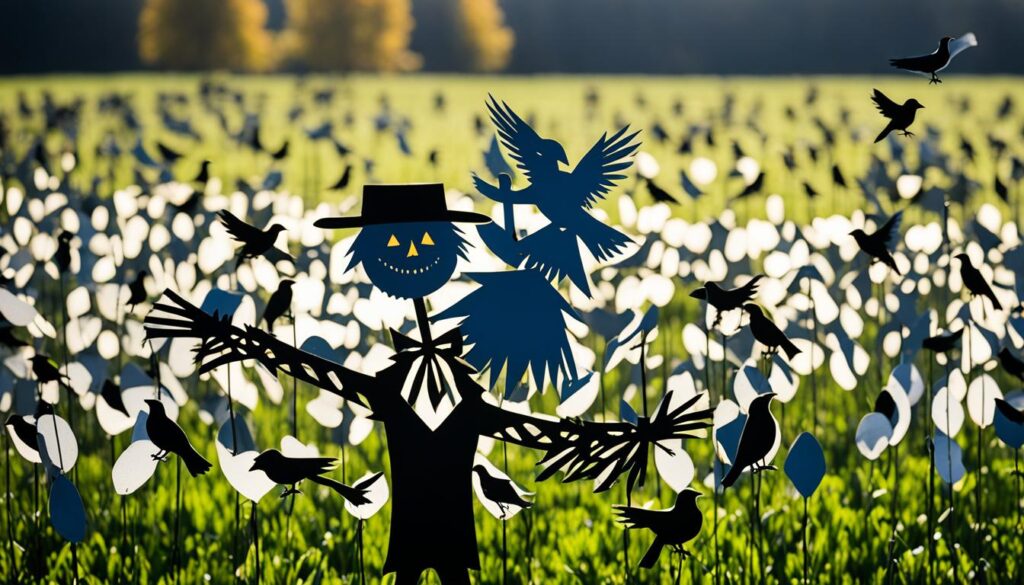
“Preventing blackbird infestations is crucial to maintaining a clean and healthy environment.”
Remove Potential Food Sources
The best way to keep blackbirds away is to cut off their food. They love wild berries, fruits, and anything edible they find. Removing these foods makes your place less welcoming to them.
Eliminate Wild Berries and Fruits
Look around your yard for berry bushes, fruit trees, or plants with edible fruits. These attract blackbirds. Cut down or trim these plants to stop the birds from coming.
Prune Trees and Bushes
Don’t forget to prune any shrubs or trees that blackbirds might use to hide or nest. Trimming the plants reduces their favorite spots to roost and breed. This makes your yard less tempting for them.
| Wild Berries and Fruits to Remove | Tips for Pruning Trees and Bushes |
|---|---|
|
|
To make your yard less attractive to blackbirds, take away their food. Also, change the landscape to discourage them from nesting and roosting in your yard. This will help keep blackbirds away.
Eliminate Perching Opportunities
Blackbirds search for high spots like tree branches and fence posts to perch. They do this to rest and keep an eye on things. To stop them from coming, you should remove these spots. Covering these high areas makes them less attractive for blackbirds.
Cover Fence Posts and Perching Spots
Covering your fence posts and such is a smart move to keep blackbirds away. Use materials like PVC, wire mesh, or spikes. This makes it hard for blackbirds to find a good spot to land. It helps lower their numbers in your yard.
Use Hanging Balloons for Events
If a party is coming up, put balloons where blackbirds like to rest. Balloons that move and shine scare the birds. They’ll look for a calmer spot away from the balloons. This trick works well for keeping your event area bird-free.
To keep blackbirds off, remove their perching spots and use tricks like balloons. Your yard will be more peaceful. These steps help control blackbird numbers and make your space nicer for other birds you like.
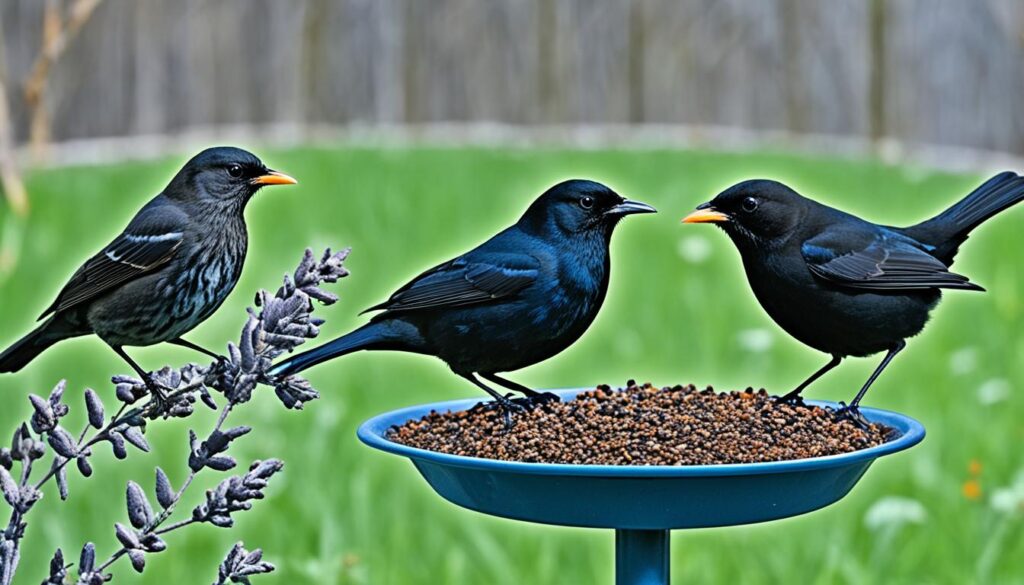
| Blackbird Species | Preferred Perching Spots | Effective Deterrents |
|---|---|---|
| Common Grackle | Fence posts, tree branches, utility wires | Covering posts, using hanging balloons |
| European Starling | Ledges, gutters, eaves, tree cavities | Covering ledges, installing spikes |
| Red-winged Blackbird | Reeds, cattails, low shrubs | Trimming vegetation, using noise deterrents |
“Eliminating perching opportunities is a crucial step in keeping blackbirds at bay and maintaining a peaceful outdoor environment.”
Create Barriers Around Gardens
Keeping garden pests like blackbirds away is tough. One way to do it is by putting up string barriers. These stop blackbirds but don’t block small birds.
Use Interlocking String Barriers
Interlocking string barriers are a great way to keep blackbirds out without harming the environment. By interlocking strings, you can make your garden safe from these pests. Follow these steps to set it up:
- Measure your garden’s perimeter to know how much string to buy.
- Start by tying the string in a grid, about 6-12 inches apart.
- Hang the strings tight at different heights, from 2 to 6 feet off the ground. This will confuse and deter the blackbirds.
- Use strings both vertically and horizontally to make a net that keeps blackbirds out.
- Check on your strings often to make sure they’re still doing their job.
This interlocking string barrier is a simple yet effective way to keep your garden safe from blackbirds. It lets small birds in but keeps the invaders out.
| Barrier Type | Effectiveness | Durability | Cost |
|---|---|---|---|
| Interlocking String Barrier | High | Moderate | Low |
| Butterfly Netting | High | High | Moderate |
| Chicken Wire | High | High | Moderate |
“Creating a physical barrier is one of the most effective ways to keep blackbirds out of your garden and protect your plants and produce.” – Gardening Expert, Jane Doe
Use Bird Deterrents
Dealing with pesky blackbirds can be tricky, but using bird deterrents is effective. The WhirlyBird Repeller is a top choice. It mixes scare tactics in a handy, single tool. This makes it great for both homes and businesses.
The WhirlyBird Repeller
The WhirlyBird Repeller looks and moves like a threatening falcon. It spins and shakes in the wind, making sounds like flying and shining like real wings. This tricks blackbirds into thinking a big, scary bird is nearby. It works by scaring them off with its look and sound.
- Mimics the appearance and behavior of a predatory falcon
- Spins, wobbles, and vibrates to create the illusion of a larger bird
- Produces sounds that mimic wing beats to scare off blackbirds
- Reflects sunlight to further enhance the intimidating effect
You can place the WhirlyBird near feeding areas, gardens, or where they usually perch. Its small, tough design means it fits well in your yard. This helps stop the blackbirds from bothering you.
“The WhirlyBird Repeller has been a game-changer in our efforts to manage the blackbird population on our property. It’s an effective and eco-friendly way to keep these birds at a distance without harming them.”
By adding the WhirlyBird to your bird control plan, you can make your space more peaceful. Use it with other bird-prevention methods to keep blackbirds away from your home.
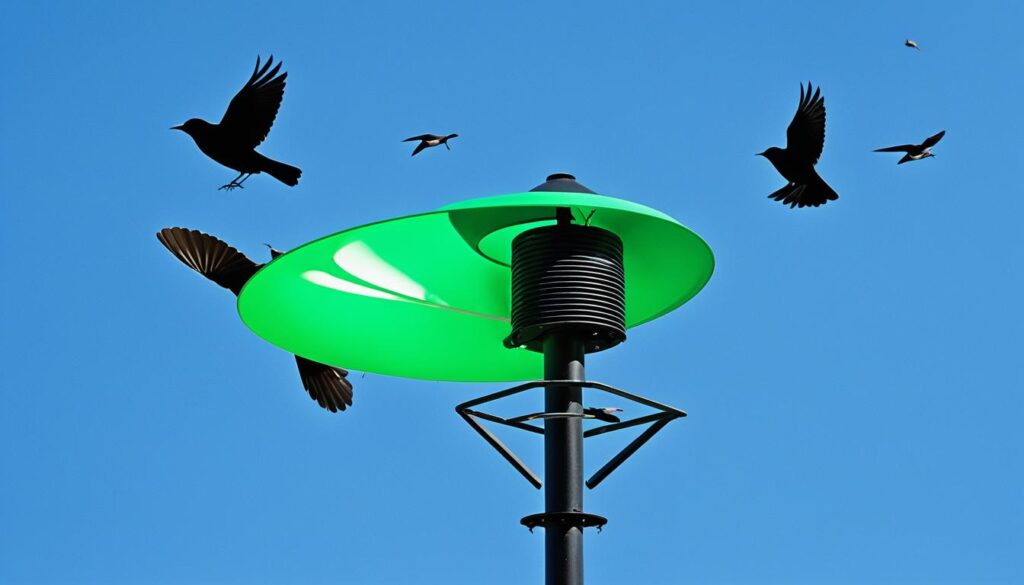
Feeder Choices to Deter Blackbirds
The type of bird feeders you pick matters in keeping blackbirds away from your yard. The right feeder designs make it hard for blackbirds to eat while still welcoming smaller birds.
Tube Feeders with Short Perches
Tube feeders are a good choice for keeping blackbirds at bay. Their narrow openings and short perches don’t fit blackbirds well. They prefer feeders with longer perches. These let them easily access food. So, choosing tube feeders with short perches can help. It makes it hard for blackbirds to get at the food.
Suet Feeders Accessible from Underside
Another good option are suet feeders that birds can reach only from beneath. Smaller birds, like woodpeckers, can grip the bottom to feed on the suet. Blackbirds, on the other hand, are not as good at this. They can’t feed easily this way, keeping the suet available for the smaller birds.
Using bird feeders that deter blackbirds is helpful. Tube feeders and suet feeders with certain designs can discourage blackbirds. This way, smaller and more desired birds can enjoy the food without much of the competition.
how to get rid of black birds
Many homeowners and gardeners find pesky blackbirds a big problem. However, you can fight back and protect your space from them. Using caged bird feeders and finch feeders with thistle seed can help keep them away.
Caged Bird Feeders
Caged bird feeders let small birds eat while keeping big blackbirds out. They have a cage around the food area. This stops blackbirds from getting to the food. Using caged bird feeders means only the bird types you like, like songbirds and finches, can eat there.
Finch Feeders with Thistle Seed
To keep blackbirds away, try using thistle seed in your feeders. Blackbirds don’t like thistle seed, so they’re less likely to come. This way, you can feed small birds, like finches, and avoid attracting blackbirds to your feeders.
“Utilizing caged bird feeders and filling them with thistle seed is a highly effective one-two punch for getting rid of pesky blackbirds and reclaiming your outdoor space.”
Combining caged bird feeders with thistle seed in finch feeders is a great strategy. It discourages blackbirds. At the same time, it creates a bird-friendly space for the smaller, prettier birds you want to see. This method is key to get rid of black birds and keep your yard lively and blackbird-free.
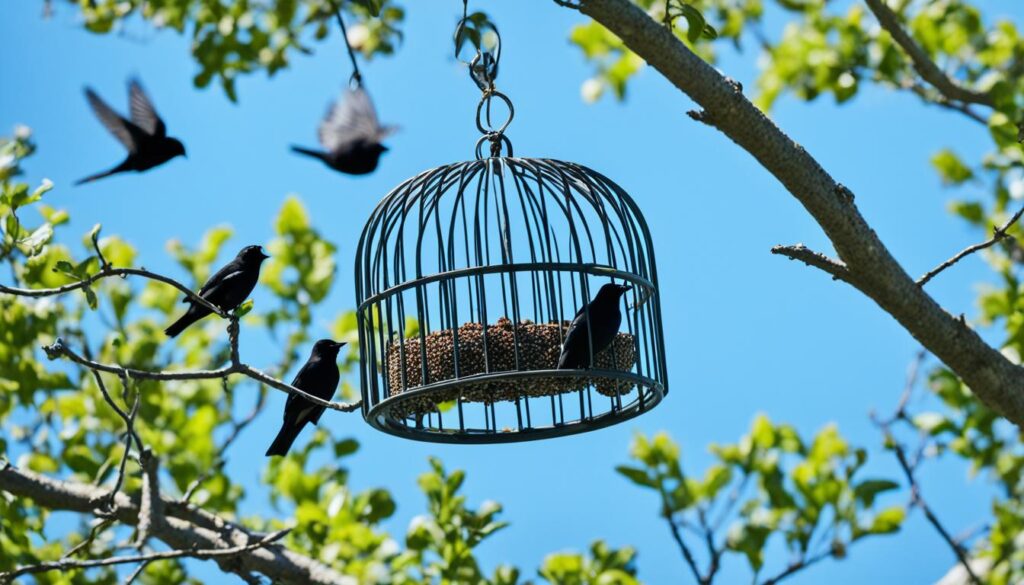
Getting Rid of Starlings
Blackbirds at bird feeders can be bothersome. However, the European starling is a bigger issue. These birds are bold and adaptable. They often take over feeder areas, leaving small songbirds out. If you want to keep starlings away, investing in a starling-proof suet feeder could be a good idea.
Starling-Proof Suet Feeders
Starling-proof suet feeders are crafted to keep the big birds at bay. They do this while still welcoming little ones to enjoy the suet. These feeders have a special design. They are tall and slender with short perches. This design makes it hard for starlings to hang on and eat. Moreover, the suet is placed in a spot that starlings find tricky to reach.
- Vertical design with short perches to deter starlings
- Suet positioned to be accessed from the underside only
- Prevents larger starlings from dominating the feeder
- Allows smaller birds to feed comfortably
A starling-proof suet feeder is a smart tool for keeping starlings out. It helps protect the smaller birds in your garden. This method aims to make your yard more inviting for the birds you love and less so for unwelcome starlings.
“Starlings are one of the most persistent and problematic bird species at feeders. Using a specialized feeder is a game-changer in deterring them and allowing smaller birds to thrive.”
Outdoor spaces can stay balanced by using more than just suet feeders. Paths to food and spots for perching should also be removed. Doing these things can help deter starlings from bird feeders and promote a healthy bird living area.
Keep Feeding Areas Clean
Cleaning around your bird feeders is key to keeping blackbirds away and preventing infestations. Blackbirds often make a mess when they eat, getting seeds all over. This mess can draw in other pests and make the area look bad and unhealthy for birds.
Use Seed Catchers and Trays
To avoid this mess, you can use seed catchers and trays. These tools catch falling seeds, ensuring they don’t gather on the ground. By doing this, you can discourage blackbirds and keep the area clean, reducing the risk of blackbird infestations.
- Seed catchers and trays help contain spilled seed, making it less accessible to blackbirds.
- Regularly cleaning and maintaining the feeding area also helps keep blackbirds away.
- Maintaining clean feeding areas is crucial to controlling blackbirds.
These small steps can make your outdoor space a welcoming, blackbird-free spot for birds to eat peacefully. Preventing blackbird infestations around bird feeders requires a few different steps. Keeping feeding areas clean is a big part of this strategy.
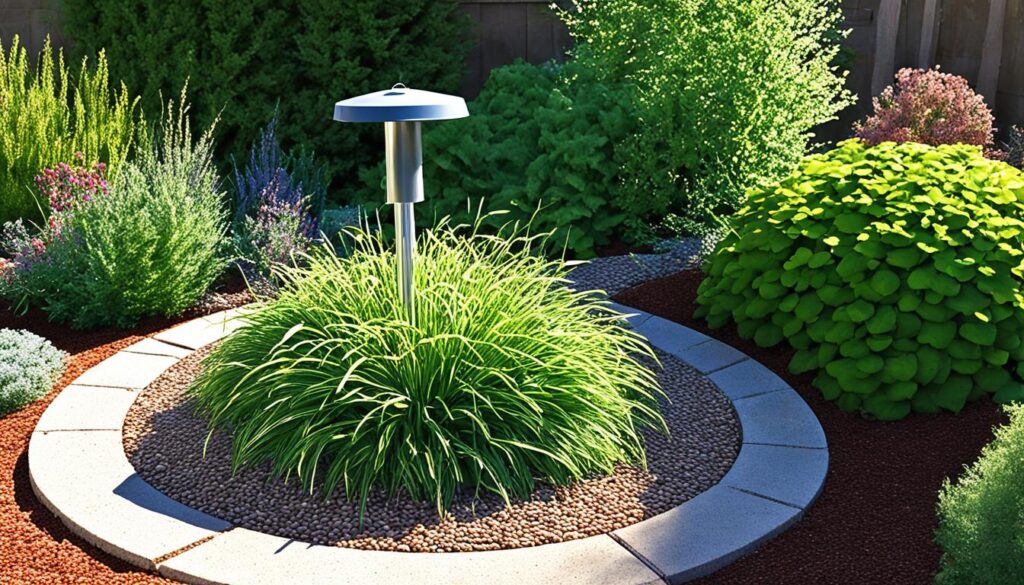
Dealing with Bully Birds at Feeders
Blackbirds are known to be mean and territorial around feeders. They often push away smaller, prettier birds. This can be annoying for people who love seeing different birds in their yards. But, don’t worry, there are ways to keep bully birds at bay.
Utilize Specialized Feeders
You can stop blackbirds by using special feeders. Choose tube feeders with short perches or suet feeders that only big birds can’t reach. This lets little birds eat in peace.
Maintain a Clean Feeding Area
Keeping your feeding spot tidy discourages blackbirds too. Use seed catchers to keep the ground clean. Also, regularly cleaning up around feeders takes away their food source.
Consider Caged Feeders
- Caged feeders keep big birds out but let small birds in.
- Try finch feeders with thistle seed. They have small perches that blackbirds don’t like.
Deter with Noise and Movement
Devices that make noise or move, like the WhirlyBird Repeller, can keep blackbirds away. This helps the smaller birds eat in peace.
“Protecting the smaller birds in your yard from aggressive blackbirds is key to maintaining a diverse and thriving backyard ecosystem.”
By using these tips together, you can make your feeder area less attractive to bully birds. This lets all kinds of birds come enjoy your feeders.
Non-Lethal Blackbird Control Methods
Blackbirds are protected by federal law, making it important to use non-lethal ways to keep their numbers in check. Luckily, many methods are both effective and kind to these birds. You can use tools and techniques that keep them away without hurting them. This includes combining different ways to make it hard for blackbirds to gather without harming them.
Integrated Pest Management Approach
An integrated method works best for controlling blackbirds. It means using different non-lethal techniques together. Some important methods include:
- Deploying propane cannons and pyrotechnics for loud noises
- Using unmanned aerial systems (drones) to disrupt blackbird flocks
- Getting rid of roosting places near farms
- Using desiccants and weed products in sunflower fields
- Changing and mixing deterrents to keep them effective
Studies show that this approach, combined with shooting now and then, can protect crops well. But, it’s key to use propane cannons safely to prevent fires and follow local rules.
Habitat Modification and Exclusion
Changing the area and putting up barriers can work against blackbirds too. Here are some ideas:
- Cutting down trees and bushes where blackbirds rest
- Putting up string barriers or netting around crops
- Getting rid of spilled grain and fallen fruit
These actions make your land less welcoming to blackbirds, stopping them from causing harm.
Emerging Technologies and Research
There’s always new research on non-lethal ways to control blackbirds. Drones are a new tool that looks promising for scattering them. The USDA and others are also testing different repellents to find more gentle ways to keep blackbirds away.
By keeping up with new methods and using a mix of strategies, you can protect your space ethically. This supports both you and the environment.

“Blackbirds are the single largest bird population in North America, causing an estimated $200 million in annual damage to crops and livestock. Implementing a combination of non-lethal deterrents and habitat modification is crucial for managing these populations in a humane and sustainable way.”
When to Call a Professional
If you’ve tried everything but still have blackbirds, getting help is wise. A wildlife control service can check your problem. They’ll suggest the best ways to remove the blackbirds legally and safely.
Getting help from experts is key for big blackbird problems. This is especially true if the birds are hurting your crops or property. These professionals know how to deal with large roosts while following laws.
Here are some signs you need professional help with blackbirds:
- Blackbird numbers keep increasing, no matter what you do
- Your crops or gardens have serious damage
- You’re worried about the health risks from the birds
- It’s hard to figure out why you have so many blackbirds
- You’re not sure if the methods you know are legal
Working with pros ensures your problem is handled well. They offer custom solutions for your situation. This helps take back your property and safeguard your investments.
Remember, for tough blackbird issues, seeking a professional is best. Contact a wildlife control service if you’re not making progress alone.
Maintaining a Blackbird-Free Yard
Keeping blackbirds out of your yard takes ongoing effort. You need to remove things that attract them and make your yard less inviting. This way, they’re less likely to stay.
There was a big problem with bird droppings last year. It took multiple cleanings a day near the pool to keep up. Efforts to scare them off with a pellet gun didn’t work well. So, a new plan is in place.
This new plan involves using bird netting and tall flagpoles around the pool. Setting up a barrier is often better than trying to scare birds away. This step is vital because blackbirds are protected by law. Homeowners can’t harm them, making prevention the best option.
The WhirlyBird Repeller is a good choice for scaring birds. It moves, makes sounds, and looks like a predator to blackbirds. Plus, it’s safe for your family and the birds. So, it’s a smart way to keep blackbirds out.
“Proper prevention methods can help avoid having blackbirds in your yard in the first place.”
Bully birds, like blackbirds, are a serious issue for many. Unlike blackbirds, some bullies can be controlled by law. For these, you can use special feeders to make it harder for them to get food.
One trick is to use specific feed and feeder types. Nyjer seed for finches, for example, is a great choice. Different feed types can make your yard less attractive to certain birds. Keeping things tidy is also important since it can help keep the bullies away.
Using these tips will make your yard less friendly to bully birds. It helps in keeping blackbirds away and maintaining a healthy yard.
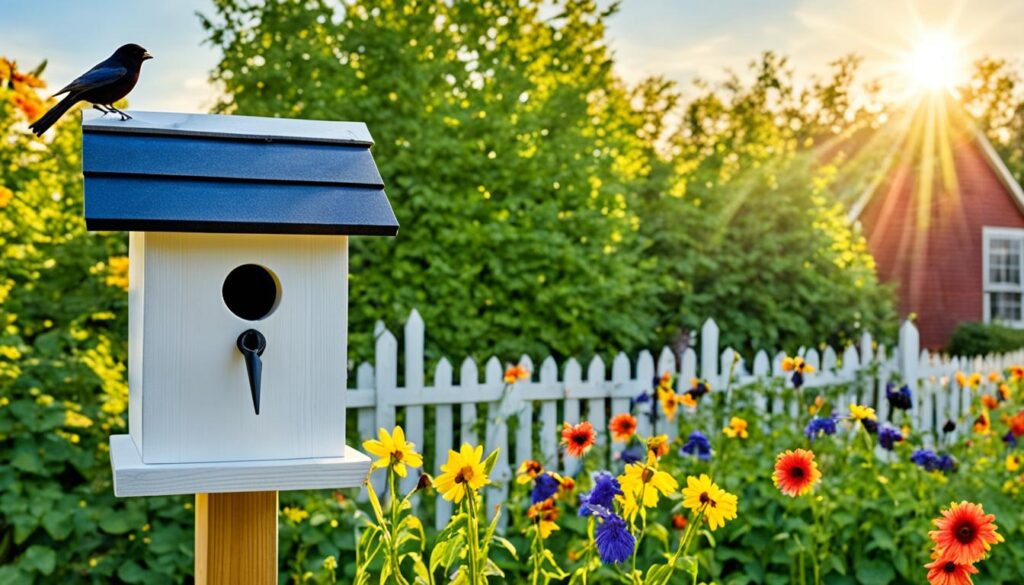
Conclusion
Effectively getting rid of blackbirds needs a thorough plan. This plan should prevent them from coming and not harm them. By taking away their food, their landing spots, using various deterrents, and changing bird feeders, you can keep them away. This way, you don’t have to use illegal or bad ways to handle them.
To get rid of blackbirds, you must stay alert. Keep doing these steps regularly and change what you do as you learn more. Make sure you act now and always. This will help keep your yard free from blackbirds and save your garden and property from their harm.
Looking at the best methods to control blackbirds shows you need a mix of efforts that watch how these birds act and changes with them. By sticking to these tips and getting help from pros, you can keep blackbirds under control. This will make sure your space is quiet and free from them.
FAQ
What are some effective ways to get rid of black birds?
To get rid of black birds like blackbirds and grackles, focus on stopping them from coming. Start by getting rid of their food. Also, don’t let them perch. You can use things like barriers and scares to keep them away. Changing your bird feeder to not attract them can help too.
Why are blackbirds problematic for homeowners?
Blackbirds can harm your property. They can also mess with food for other animals and push them away. But remember, it’s against the law to harm these birds. So, use methods that are safe for them and for other birds.
How can I prevent blackbirds from infesting my yard?
The best way to stop blackbirds from coming is to not give them a reason to. Get rid of food they like, cut back on trees and bushes, and block where they can sit. Putting up barriers and things that scare them can help keep your yard blackbird-free.
What types of bird feeders can help deter blackbirds?
Use feeders that make it hard for blackbirds to sit or eat comfortably. Tube feeders with short perches, suet feeders that hang, feeders with cages around them, and thistle in finch feeders are good. This way, the big blackbirds can’t take over the food from smaller birds.
How can I deal with aggressive blackbirds at my bird feeders?
To handle blackbirds that fight and scare off other birds, keep your feeders clean. Also, pick feeders that keep them out and use things that scare them away. This makes it safer for the small birds to enjoy the feeders too.
When should I call in a professional for blackbird control?
If you’ve tried a lot and blackbirds are still a big problem, call a wildlife expert. They will look at what’s going on and suggest ways to get rid of the blackbirds. They know how to do it legally and safely for the birds and your property.
